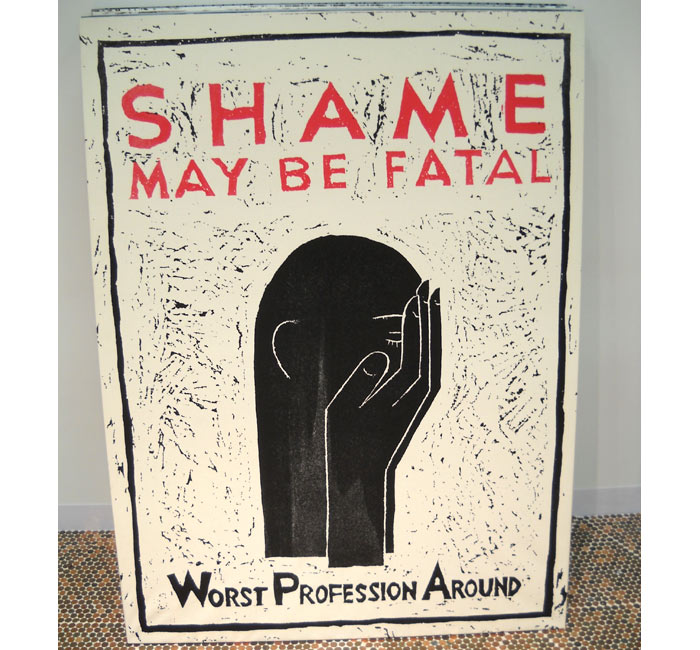
Thursday
A recent open letter published by Harper’s and signed by a distinguished list of writers, academics, political columnists and others has me thinking of a fable my father wrote in the 1960s or 1970s. At the time, the issue was political correctness, which is why the poem seems timely. Except for the mimeograph imagery, that is.
The Harper’s letter worries that rightwing intolerance is leading to leftwing intolerance. The following excerpt sums up the concerns:
The forces of illiberalism are gaining strength throughout the world and have a powerful ally in Donald Trump, who represents a real threat to democracy. But resistance must not be allowed to harden into its own brand of dogma or coercion—which right-wing demagogues are already exploiting. The democratic inclusion we want can be achieved only if we speak out against the intolerant climate that has set in on all sides.
The free exchange of information and ideas, the lifeblood of a liberal society, is daily becoming more constricted. While we have come to expect this on the radical right, censoriousness is also spreading more widely in our culture: an intolerance of opposing views, a vogue for public shaming and ostracism, and the tendency to dissolve complex policy issues in a blinding moral certainty. We uphold the value of robust and even caustic counter-speech from all quarters. But it is now all too common to hear calls for swift and severe retribution in response to perceived transgressions of speech and thought. More troubling still, institutional leaders, in a spirit of panicked damage control, are delivering hasty and disproportionate punishments instead of considered reforms. Editors are fired for running controversial pieces; books are withdrawn for alleged inauthenticity; journalists are barred from writing on certain topics; professors are investigated for quoting works of literature in class; a researcher is fired for circulating a peer-reviewed academic study; and the heads of organizations are ousted for what are sometimes just clumsy mistakes. Whatever the arguments around each particular incident, the result has been to steadily narrow the boundaries of what can be said without the threat of reprisal. We are already paying the price in greater risk aversion among writers, artists, and journalists who fear for their livelihoods if they depart from the consensus, or even lack sufficient zeal in agreement.
“The Recalcitrant Sheet of Mimeograph Paper” is about a piece of paper that remains blank rather than surrender to the operator’s agenda. It refuses to allow its backside to be “tattooed” with “the decadent artifacts of a worn-out bureaucracy.” Consider it a member of the Trump Resistance.
In its rebellion, however, it falls into a different kind of conformity so that, by the end, it is citing the famous finale of The Communist Manifesto. Its threat sounds no less “sheeplike” and bureaucratic than the docile conformists and blank imbeciles who were its former compatriots.
Before proceeding with any discussion of cancel culture, caution is required. The right is far more likely to use force when it exerts pressure. Trump’s cancellations, backed up by federal power, are far more severe than any virtue shaming that we see on the left, and there have been far too many instances of police literally canceling black lives that made white people uncomfortable.
For that matter, look at all the Republicans who have been driven from the party for voicing doubts about Trump. Look also at those who sell their souls or remain silent to avoid such a fate. Nothing close to this is happening on the left.
We should remind ourselves that “political correctness,” while weaponized by the right, was initially used by liberals to call out their own excesses. In other words, they were willing to engage in self-criticism in the way that the right seldom is. It was in this spirit of introspection that Barack Obama recently called out those leftists who self-righteously excoriate others to prove how woke they are. This is not how you build effective coalitions and bring about needed political change, he warned.
Both the Harper’s letter and Scott Bates’s poem should be read in this light. It’s okay to be “muddied” by allies who are less enlightened than you. It’s okay to vote for the lesser of two evils. The stakes in the upcoming election are too serious to be sidetracked by purity battles.
The Recalcitrant Piece of Mimeograph Paper
By Scott Bates
A Sheet of Mimeograph Paper refused to go through the machine
No no it cried
Set me apart
Must I serve as fodder for a Mimeograph Moloch
Reduced
To the docile conformity and blank imbecility of my sheeplike compatriots
My purity sullied
My innocence destroyed
Will you track up my candor with your muddy feet
No no I protest
I refuse
Let me be crumpled into cabbage
Peeled into carrot strips
Abandoned with the used kleenices holey hermit sacks outcast chewing gum wrappers and all the other paper pariahs of your so-called civilization
Before you tattoo my backside with the decadent artifacts of a worn-out bureaucracy
They fed it through the machine
It came out blank
They fed it through again
Inexorably
At last it spoke
Dear Sirs it said
Pursuant to your request of long standing
And in full cognizance of the numerous difficulties involved
I am authorized to inform you at this time
You have nothing to lose but your chains